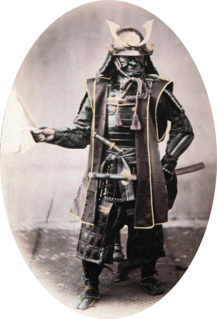
Samurai (侍) were the hereditary military nobility and officer caste of medieval and early-modern Japan from the late 12th century to their abolition in 1876. They were the well-paid retainers of the daimyo. They had high prestige and special privileges such as wearing two swords. They cultivated the bushido codes of martial virtues, indifference to pain, and unflinching loyalty, engaging in many local battles. During the peaceful Edo era they became the stewards and chamberlains of the daimyo estates, gaining managerial experience and education. In the 1870s samurai families comprised 5% of the population. The Meiji Revolution ended their feudal roles, and they moved into professional and entrepreneurial roles. Their memory and weaponry remain prominent in Japanese popular culture.

Seven Samurai is a 1954 Japanese epic samurai drama film co-written, edited, and directed by Akira Kurosawa. The story takes place in 1586 during the Sengoku period of Japanese history. It follows the story of a village of desperate farmers who hire seven rōnin to combat bandits who will return after the harvest to steal their crops.
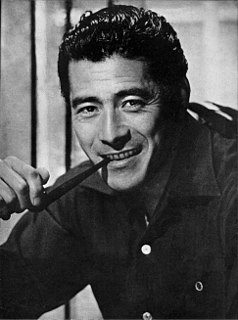
Toshiro Mifune was a Japanese actor who appeared in over 150 feature films. He is best known for his 16-film collaboration (1948–1965) with Akira Kurosawa in such works as Rashomon, Seven Samurai, The Hidden Fortress, Throne of Blood, and Yojimbo. He also portrayed Miyamoto Musashi in Hiroshi Inagaki's Samurai Trilogy and one earlier Inagaki film, Lord Toranaga in the NBC television miniseries Shōgun, and Admiral Isoroku Yamamoto in three different films.
Rashomon is a 1950 Jidaigeki psychological thriller/crime film directed by Akira Kurosawa, working in close collaboration with cinematographer Kazuo Miyagawa. Starring Toshiro Mifune, Machiko Kyō, Masayuki Mori, and Takashi Shimura as various people who describe how a samurai was murdered in a forest, the plot and characters are based upon Ryunosuke Akutagawa’s short story "In a Grove", with the title and framing story being based on "Rashomon", another short story by Akutagawa. Every element is largely identical, from the murdered samurai speaking through a Shinto psychic to the bandit in the forest, the monk, the rape of the wife, and the dishonest retelling of the events in which everyone shows his or her ideal self by lying.
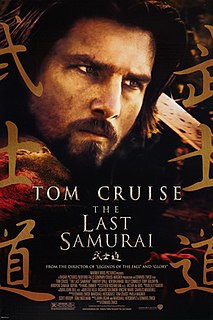
The Last Samurai is a 2003 American epic period action drama film directed and co-produced by Edward Zwick, who also co-wrote the screenplay with John Logan and Marshall Herskovitz. The film stars Tom Cruise, who also co-produced, with Timothy Spall, Ken Watanabe, Billy Connolly, Tony Goldwyn, Hiroyuki Sanada, Koyuki, and Shin Koyamada in supporting roles.

Ken Watanabe is a Japanese actor. To English-speaking audiences, he is known for playing tragic hero characters, such as General Tadamichi Kuribayashi in Letters from Iwo Jima and Lord Katsumoto Moritsugu in The Last Samurai, for which he was nominated for the Academy Award for Best Supporting Actor. Among other awards, he has won the Japan Academy Film Prize for Best Actor twice, in 2007 for Memories of Tomorrow and in 2010 for Shizumanu Taiyō. He is also known for his roles in Christopher Nolan's films Batman Begins and Inception, Memoirs of a Geisha and Pokémon Detective Pikachu.
Samurai Jack is an American animated television series created by Genndy Tartakovsky for Cartoon Network. Tartakovsky conceived Samurai Jack after finishing his work on his first Cartoon Network original series, Dexter's Laboratory, which premiered in 1996. Samurai Jack was inspired by Kung Fu, the 1972 televised drama starring David Carradine, and Tartakovsky's fascination with samurai culture.

Tetsurō Tamba was a Japanese actor with a career spanning five decades. He is best known in the West for his role in the 1967 James Bond film You Only Live Twice as Tiger Tanaka.
In the early years of the 1970s comedy TV show Saturday Night Live, John Belushi portrayed an archetypal samurai — he had a dedicated concept of honor, spoke only (mock) Japanese, and wielded a katana. Sketches featuring the character showed him in different occupations that would not be expected for a samurai. He always performed his tasks perfectly, despite scaring his clients quite a few times. The character was modeled after Toshiro Mifune's character in Akira Kurosawa's Yojimbo.
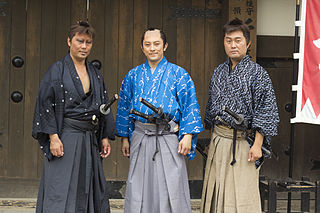
Jidaigeki is a genre of film, television, video game, and theatre in Japan. Literally meaning "period dramas", they are most often set during the Edo period of Japanese history, from 1603 to 1868. Some, however, are set much earlier—Portrait of Hell, for example, is set during the late Heian period—and the early Meiji era is also a popular setting. Jidaigeki show the lives of the samurai, farmers, craftsmen, and merchants of their time. Jidaigeki films are sometimes referred to as chambara movies, a word meaning "sword fight", though chambara is more accurately a subgenre of jidaigeki. Jidaigeki rely on an established set of dramatic conventions including the use of makeup, language, catchphrases, and plotlines.

Hiroyuki Sanada is a Japanese actor. He is best known for his role as Tasogare Seibei and Ujio. His role as 'The Fool' in the Shakespeare play King Lear also gave him notable theatrical notice in the United Kingdom. In Japan, Sanada is also known for songs he recorded for movies he was in as well as songs he’s performed for the public.
A samurai is a member of the Japanese warrior caste.
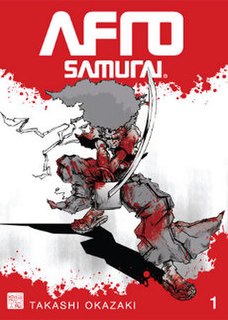
Afro Samurai is a Japanese seinendōjinshi manga series written and illustrated by manga artist Takashi Okazaki. It was originally serialized irregularly in the avant-garde dōjinshi manga magazine Nou Nou Hau from November 1998 to September 2002. Inspired by Okazaki's love of soul and hip hop music and American media, it follows the life of Afro Samurai who witnessed his father, Rokutaro being killed by a male gunslinger named Justice while he was a child. As an adult, Afro sets off to kill Justice and avenge his father.

Sōsuke Ikematsu is a Japanese actor, television, and theatre actor best known for his role as Higen, the young nephew of samurai leader Katsumoto, in the 2003 film The Last Samurai.
Ryo Nishikido is a Japanese singer and actor. He was formerly under the management of Johnny & Associates as a member of Japanese boy bands Kanjani Eight and News. His first solo album was released in December 2019.

Chanbara (チャンバラ), also commonly spelled "chambara", meaning "sword fighting" movies, denotes the Japanese film genre called samurai cinema in English and is roughly equivalent to Western and swashbuckler films. Chanbara is a sub-category of jidaigeki, which equates to period drama. Jidaigeki may refer to a story set in a historical period, though not necessarily dealing with a samurai character or depicting swordplay.
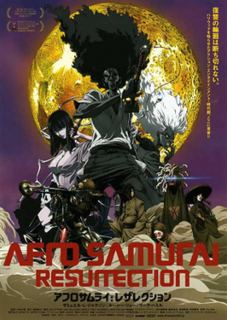
Afro Samurai: Resurrection, is a 2009 Japanese anime television film sequel to the miniseries of 2007, Afro Samurai, starring Samuel L. Jackson and Lucy Liu. It aired on Paramount Network on January 25, 2009.

Seppuku, sometimes referred to as Harakiri, is a form of Japanese ritual suicide by disembowelment. It was originally reserved for samurai in their code of honor but was also practiced by other Japanese people during the Shōwa period to restore honor for themselves or for their families. As a samurai practice, seppuku was used voluntarily by samurai to die with honor rather than fall into the hands of their enemies, as a form of capital punishment for samurai who had committed serious offenses, or performed because they had brought shame to themselves. The ceremonial disembowelment, which is usually part of a more elaborate ritual and performed in front of spectators, consists of plunging a short blade, traditionally a tantō, into the belly and drawing the blade from left to right, slicing the belly open. If the cut is deep enough, it can sever the descending aorta, causing a rapid death by blood loss.

The Wolverine is a 2013 superhero film featuring the Marvel Comics character Wolverine. It is the sixth installment in the X-Men film series, the second installment in the trilogy of Wolverine films after X-Men Origins: Wolverine (2009), and a spin-off/sequel to X-Men: The Last Stand (2006). Directed by James Mangold from a screenplay written by Scott Frank and Mark Bomback, based on the 1982 limited series Wolverine by Chris Claremont and Frank Miller, it stars Hugh Jackman as Logan / Wolverine, alongside Rila Fukushima, Tao Okamoto, Hiroyuki Sanada, Famke Janssen, and Will Yun Lee. Following the events of X-Men: The Last Stand, Logan travels to Japan, where he engages an old acquaintance in a struggle that has lasting consequences. Stripped of his healing powers, Wolverine must battle deadly samurai while struggling with guilt over Jean Grey's death.
TVPaint Animation is a 2D paint and digital animation software package developed by TVPaint Developpement SARL based in Lorraine (France). Originally released for Amiga in 1991, version 3.0 (1994) introduced support for other platforms. In 1999, the last Amiga version 3.59 was released as free download.












